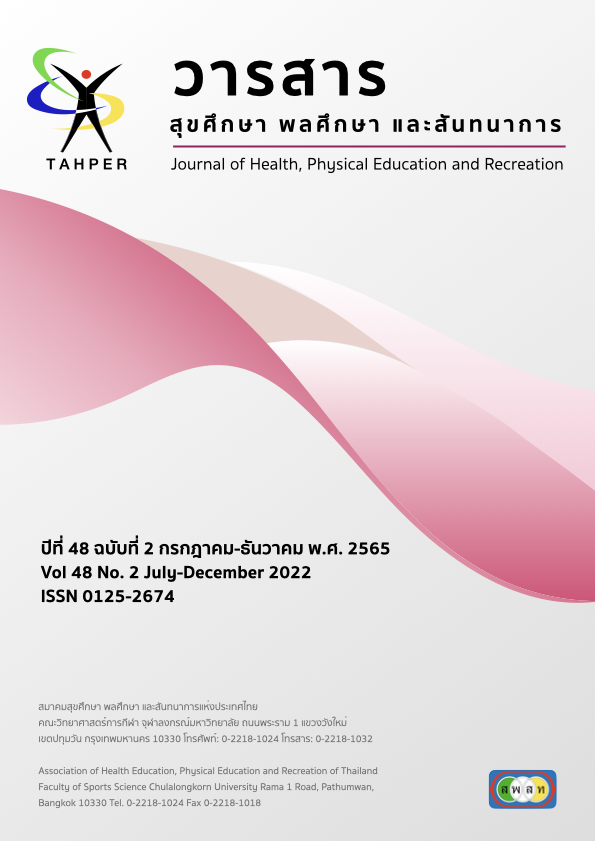การจัดการเรียนรู้พลศึกษาโดยใช้การละเล่นพื้นบ้านไทยเพื่อส่งเสริม สมรรถภาพทางกาย ความซื่อสัตย์และความรับผิดชอบของเด็กปฐมวัย Physical Education Learning Management Using Thai Folk Games to Enhance Physical Fitness, Honesty and Responsibility of Early Childhood
Main Article Content
Abstract
บทคัดย่อ
การวิจัยครั้งนี้มีวัตถุประสงค์เพื่อศึกษาการจัดการเรียนรู้พลศึกษาโดยใช้การละเล่นพื้นบ้านไทยเพื่อส่งเสริมสมรรถภาพทางกาย ความซื่อสัตย์และความรับผิดชอบของเด็กปฐมวัย ระหว่างกลุ่มทดลองที่ได้รับการจัดเรียนรู้พลศึกษาโดยใช้การละเล่นพื้นบ้านไทย กับกลุ่มควบคุมที่ได้รับการจัดการเรียนรู้พลศึกษาตามปกติ ตัวอย่างเป็นนักเรียนปฐมวัยชั้นปีที่ 2 อายุ 5-6 ปี จำนวน 46 คน ตัวอย่างได้มาจาก วิธีการเลือกแบบเจาะจง โดยกลุ่มทดลอง 23 คน และกลุ่มควบคุม จำนวน 23 คน เครื่องมือที่ใช้ในการวิจัย คือ แผนการจัดการเรียนรู้พลศึกษาโดยใช้การละเล่นพื้นบ้านไทย จำนวน 16 แผน แบบทดสอบสมรรถภาพทางกายและแบบวัดความซื่อสัตย์และความรับผิดชอบ ดำเนินการทดลองเป็นระยะเวลา 8 สัปดาห์ สัปดาห์ละ 2 ครั้ง ครั้งละ 45 นาที และทำการเปรียบเทียบความแตกต่างของค่าเฉลี่ยของคะแนนทดสอบสมรรถภาพทางกายและพฤติกรรมด้านความซื่อสัตย์และความรับผิดชอบวิเคราะห์ข้อมูลโดยใช้ค่าเฉลี่ย ส่วนเบี่ยงเบนมาตรฐาน ทดสอบความแตกต่างค่าเฉลี่ยของคะแนนด้วยค่า “ที” (T-test) ก่อนและหลังการทดลองแล้วทำการทดสอบสมรรถภาพทางกายและแบบวัดพฤตติกรรมความซื่อสัตย์และความรับผิดชอบก่อนการทดลองและหลังการทดลอง โดยทดสอบความมีนัยสำคัญทางสถิติที่ระดับ .05
ผลการวิจัยพบว่า กลุ่มทดลองและกลุ่มควบคุม แตกต่างกันอย่างมีนัยสำคัญทางสถิติที่ระดับ .05 สรุปได้ว่าการจัดการเรียนรู้พลศึกษาโดยใช้การละเล่นพื้นบ้านไทยสามารถส่งเสริมสมรรถภาพภาพทางกาย ความซื่อสัตย์และความรับผิดชอบของเด็กปฐมวัย
คำสำคัญ : การละเล่นพื้นบ้านไทย, สมรรถภาพทางกาย, ความซื่อสัตย์, ความรับผิดชอบ, ปฐมวัย
Abstract
This study aimed at the physical education learning management using Thai folk games to enhance physical fitness, honesty and responsibility in early childhood, between the experimental which received physical education learning management using Thai folk games and the control group which received regular learning management. 46 subjects from early childhood, age 5-6 years old, students were purposive selection. There were 23 students in the experimental group and 23 students in the control group. The research instruments were comprised of sixteen physical education learning management using Thai folk games, physical fitness test, honesty and responsibility test. The total duration of learning management is 8 weeks, 2 days a week and 45 minutes. The data were analyzed by mean, standard deviation and t-test. Compare the difference of the average t-test scores of the physical fitness honesty and responsibility test before and after the trial to test the importance of statistically significant difference at .05 level.
The results were as follows: the experimental group which received physical education learning management using Thai folk games and the control group which received regular learning management. Physical fitness honesty and responsibility were the statistically significant difference at .05 level.
Keywords: Thai Folk Games, Physical Fitness, Honesty, Responsibility, Early Childhood
Article Details

This work is licensed under a Creative Commons Attribution-NonCommercial-NoDerivatives 4.0 International License.
Critical thinking in journals is the right of the author. The Association of Health Education, Physical Education and Recreation of Thailand is not always required, to create diversity in ideas and creativity.
ความคิด ข้อวิพากษ์ในวารสารเป้นสิทธิของผู้เขียน สมาคมสุขศึกษา พลศึกษา และสันทนาการแห่งประเทศไทยไม่จำเป็นต้องเห็นชอบด้วยเสมอไป เพื่อให้เกิดความหลากหลายในความคิดและความสร้างสรรค์


